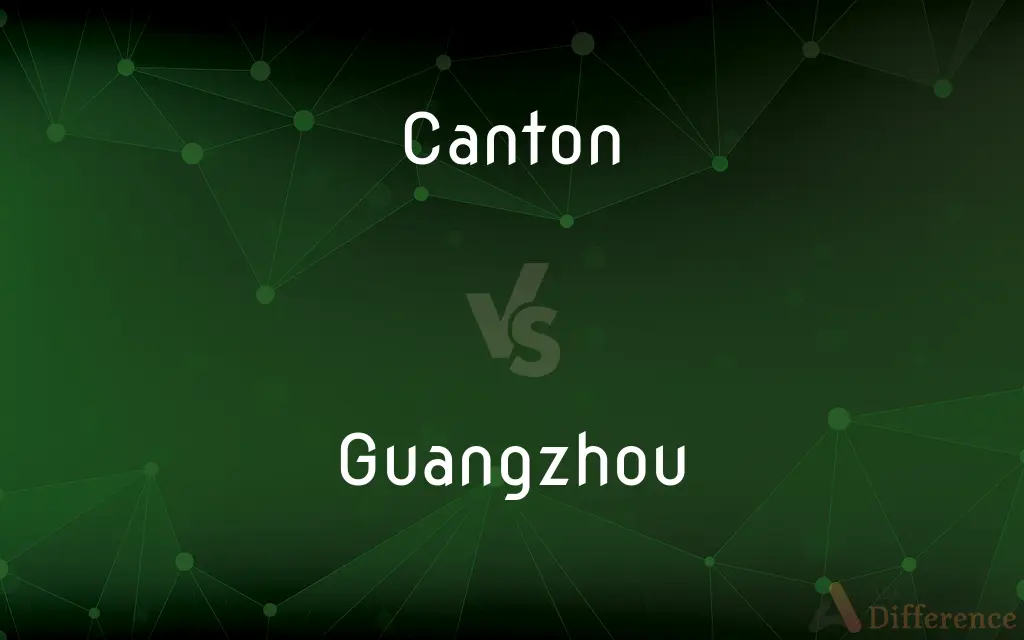Canton vs. Guangzhou — What's the Difference?
Edited by Tayyaba Rehman — By Fiza Rafique — Updated on April 21, 2024
Canton and Guangzhou refer to the same city, with "Canton" being the older, English name while "Guangzhou" is the modern, official Chinese name.

Difference Between Canton and Guangzhou
Table of Contents
ADVERTISEMENT
Key Differences
Canton is the name historically used by English speakers and many Westerners to refer to Guangzhou, one of China's largest cities. Whereas, Guangzhou is the contemporary name used officially and locally within China. This reflects a shift towards adopting Pinyin, the standardized romanization system for Chinese characters, in place of older Westernized names.
Canton was commonly used during the colonial period and early interactions between China and Western countries. On the other hand, Guangzhou has been increasingly adopted in international contexts since the late 20th century following China's economic opening and the adoption of Pinyin for transliteration.
In literature and historical documents, the name Canton often appears, reflecting the city's importance in trade, especially during the times of the Canton Trade System. Meanwhile, Guangzhou is more likely to appear in contemporary discussions, political contexts, and modern mapping systems, indicating its role as a dynamic, modern metropolis.
Tourism and international exchanges often use both names, but Guangzhou is emphasized to align with current official maps and guides. On the other hand, Canton may still be used in cultural and historical contexts, often to evoke a sense of the city’s rich, layered past.
In the linguistic and educational spheres, the transition from Canton to Guangzhou serves as a case study in the broader movement across China to standardize place names as part of the Pinyin system. Conversely, Canton remains a testament to the linguistic and cultural imprints left by colonial and foreign influences.
ADVERTISEMENT
Comparison Chart
Official Usage
No
Yes
Historical Context
Colonial period
Modern period
Name Origin
Western
Chinese
Usage in Maps
Rare
Common
Recognition in China
Limited
Universal
Compare with Definitions
Canton
Former English name for Guangzhou.
Canton was a central hub during the early trade between China and Europe.
Guangzhou
Used in all current maps and official documents.
Tourist maps of China now feature Guangzhou prominently.
Canton
Often used in older English-language literature.
Older maps of China still mark Guangzhou as Canton.
Guangzhou
Represents the modern, dynamic capital of Guangdong province.
Guangzhou is known for its towering skyscrapers and bustling economy.
Canton
Less commonly used in modern contexts.
Canton is seldom used in official contexts today compared to Guangzhou.
Guangzhou
Official name of the city formerly known as Canton.
Guangzhou hosts the famous Canton Fair annually.
Canton
Historically associated with the Canton System of trade.
The Canton System restricted all foreign trade to the port of Canton.
Guangzhou
Emphasized in educational texts to reflect standardized Mandarin pronunciation.
Chinese language courses teach the pronunciation of Guangzhou in Pinyin.
Canton
Reflects colonial-era nomenclature.
Canton's use in English reflected Western adaptations of Chinese place names.
Guangzhou
Integral to China's contemporary cultural and economic landscape.
Guangzhou's development reflects China's rapid urban growth.
Canton
A small territorial division of a country, especially one of the states of Switzerland.
Guangzhou
Guangzhou (UK: , US: ; simplified Chinese: 广州; traditional Chinese: 廣州; pinyin: Guǎngzhōu; Cantonese pronunciation: [kʷɔ̌ːŋ.tsɐ̂u] or [kʷɔ̌ːŋ.tsɐ́u] (listen); Mandarin pronunciation: [kwàŋ tʂóu] (listen)), also known as Canton and alternatively romanized as Kwongchow or Kwangchow, is the capital and the largest city of Guangdong province in southern China. Located on the Pearl River about 120 km (75 mi) north-northwest of Hong Kong and 145 km (90 mi) north of Macau, Guangzhou has a history of over 2,200 years and was a major terminus of the maritime Silk Road, and continues to serve as a major port and transportation hub, as well as one of China's three largest cities.
Canton
A subdivision of an arrondissement in France.
Guangzhou
A city on the Zhu Jiangi delta in southern China; the capital of Guangdong province and a major deep-water port
Canton
(Heraldry) A small, square division of a shield, usually in the upper right corner.
Canton
A usually rectangular division of a flag, occupying the upper corner next to the staff.
Canton
A division of a political unit.
Canton
One of the states comprising the Swiss Confederation. Category:en:Switzerland
Canton
A subdivision of an arrondissement of France. Category:en:France
Canton
A division of Luxembourg, Federation of Bosnia and Herzegovina, etc.
Canton
(obsolete) A subdivision of a county, of Quebec, Canada; equivalent to a township. Category:en:Quebec
Canton
A small community or clan.
Canton
A subdivision of a flag, the rectangular inset on the upper hoist (i.e., flagpole) side (e.g., the stars of the US national flag are in a canton).
Canton
(heraldry) A division of a shield occupying one third of the chief, usually on the dexter side, formed by a perpendicular line from the top meeting a horizontal line from the side.
Canton
(transitive) To delineate as a separate district.
Canton
(transitive) To divide into cantons.
Canton
(transitive) To allot quarters to troops.
Canton
A song or canto
Write loyal cantons of contemned love.
Canton
A small portion; a division; a compartment.
That little canton of land called the "English pale"
There is another piece of Holbein's, . . . in which, in six several cantons, the several parts of our Savior's passion are represented.
Canton
A small community or clan.
Canton
A small territorial district; esp. one of the twenty-two independent states which form the Swiss federal republic; in France, a subdivision of an arrondissement. See Arrondissement.
Canton
A division of a shield occupying one third part of the chief, usually on the dexter side, formed by a perpendicular line from the top of the shield, meeting a horizontal line from the side.
The king gave us the arms of England to be borne in a canton in our arms.
Canton
To divide into small parts or districts; to mark off or separate, as a distinct portion or division.
They canton out themselves a little Goshen in the intellectual world.
Canton
To allot separate quarters to, as to different parts or divisions of an army or body of troops.
Canton
A city on the Zhu Jiangi delta in southern China; the capital of Guangdong province and a major deep-water port
Canton
A small administrative division of a country
Canton
Provide housing for (military personnel)
Canton
Divide into cantons, of a country
Common Curiosities
What is the difference between Canton and Guangzhou?
Canton and Guangzhou refer to the same city; Canton is the historical English name, while Guangzhou is the modern, official Chinese name.
What led to the change from Canton to Guangzhou?
The change was part of a broader move in China to standardize place names using the Pinyin system of romanization.
How do locals refer to their city, Canton or Guangzhou?
Locals refer to it as Guangzhou.
Can I find maps that still refer to Guangzhou as Canton?
It is rare, but some historical or older maps might still label Guangzhou as Canton.
Why do some people still use the name Canton?
Some people use Canton out of historical habit or when referring to the city in a historical or cultural context.
Does the name change affect travelers to the city?
For travelers, using Guangzhou is more practical and widely understood, especially when navigating modern services and maps.
Why is Guangzhou sometimes still called Canton in the West?
It's largely due to historical legacy and the slower adaptation of updated names in foreign languages.
Is Canton still used in official contexts?
No, Guangzhou is the name used in all official and most contemporary contexts.
What is the significance of Guangzhou in modern China?
Guangzhou is a major economic and cultural hub in southern China, reflecting the country's dynamic growth.
In what contexts might the name Canton appear today?
Canton might appear in historical discussions, older literature, and when discussing the city's past trade practices.
Is there a difference in how Canton and Guangzhou are perceived internationally?
Internationally, Guangzhou is recognized as the official and contemporary name, while Canton may carry historical connotations.
Are there other Chinese cities with similar name changes?
Yes, many Chinese cities underwent similar changes, such as Beijing (formerly Peking) and Mumbai (formerly Bombay).
What is the Canton Fair?
The Canton Fair, officially called the China Import and Export Fair, is held in Guangzhou and is one of the largest trade fairs in the world.
Does the name change from Canton to Guangzhou reflect broader cultural shifts?
Yes, it reflects broader efforts to align Chinese cultural heritage with modern identity and standardized language.
How do educational materials handle the name difference?
Educational materials, especially newer ones, use Guangzhou to conform with current language standards and geographical accuracy.
Share Your Discovery

Previous Comparison
Nourish vs. Nurture
Next Comparison
Cartel vs. SyndicateAuthor Spotlight
Written by
Fiza RafiqueFiza Rafique is a skilled content writer at AskDifference.com, where she meticulously refines and enhances written pieces. Drawing from her vast editorial expertise, Fiza ensures clarity, accuracy, and precision in every article. Passionate about language, she continually seeks to elevate the quality of content for readers worldwide.
Edited by
Tayyaba RehmanTayyaba Rehman is a distinguished writer, currently serving as a primary contributor to askdifference.com. As a researcher in semantics and etymology, Tayyaba's passion for the complexity of languages and their distinctions has found a perfect home on the platform. Tayyaba delves into the intricacies of language, distinguishing between commonly confused words and phrases, thereby providing clarity for readers worldwide.














































